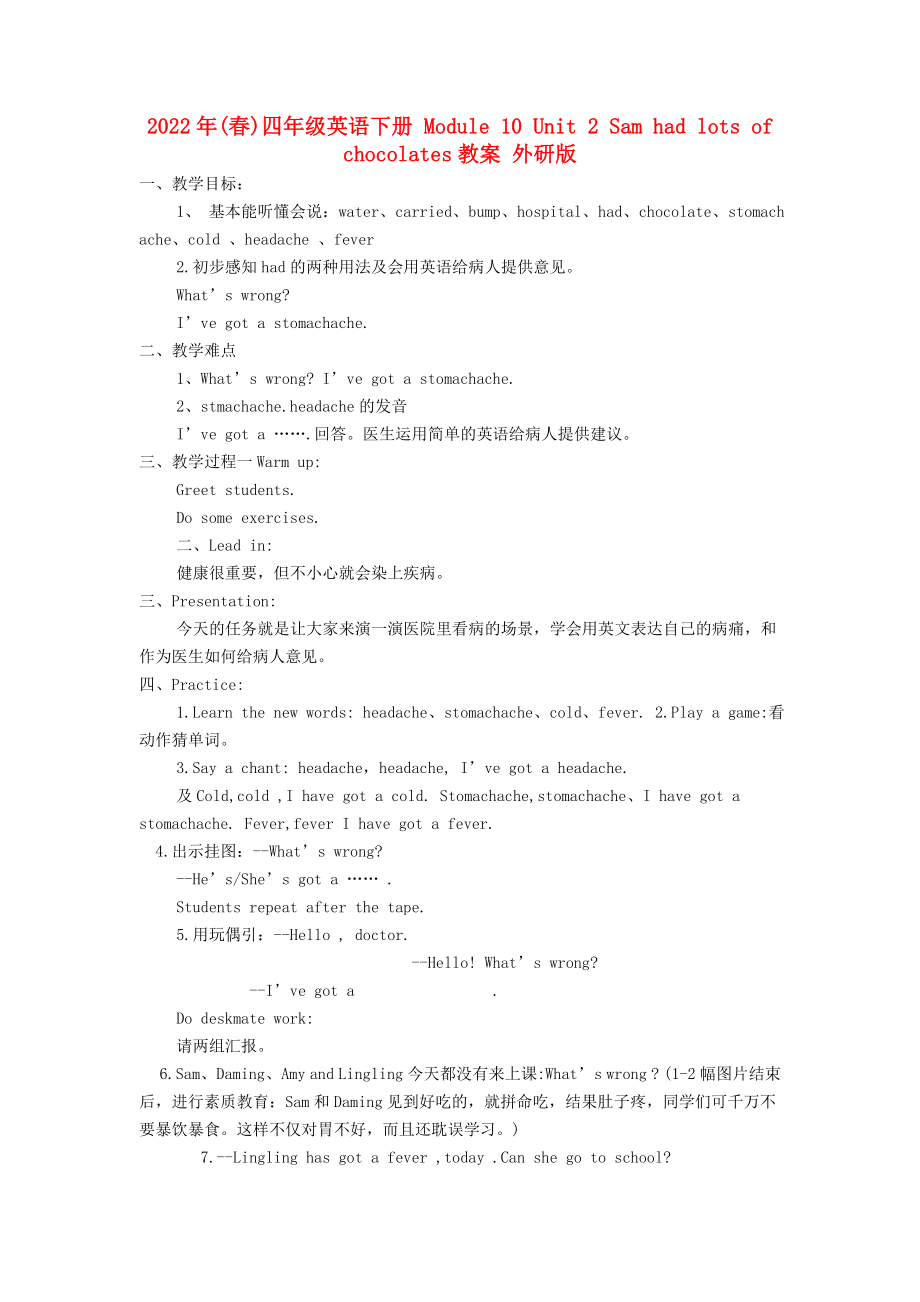《2022年(春)四年級(jí)英語(yǔ)下冊(cè) Module 10 Unit 2 Sam had lots of chocolates教案 外研版》由會(huì)員分享���,可在線閱讀���,更多相關(guān)《2022年(春)四年級(jí)英語(yǔ)下冊(cè) Module 10 Unit 2 Sam had lots of chocolates教案 外研版(2頁(yè)珍藏版)》請(qǐng)?jiān)谘b配圖網(wǎng)上搜索。
1�、2022年(春)四年級(jí)英語(yǔ)下冊(cè) Module 10 Unit 2 Sam had lots of chocolates教案 外研版
一、教學(xué)目標(biāo):
1�����、 基本能聽(tīng)懂會(huì)說(shuō):water��、carried�、bump、hospital���、had��、chocolate�����、stomach ache���、cold 、headache ���、fever
2.初步感知had的兩種用法及會(huì)用英語(yǔ)給病人提供意見(jiàn)��。
What’s wrong?
I’ve got a stomachache.
二�����、教學(xué)難點(diǎn)
1��、What’s wrong? I’ve got a stomachache.
2��、stmachache.head
2��、ache的發(fā)音
I’ve got a …….回答��。醫(yī)生運(yùn)用簡(jiǎn)單的英語(yǔ)給病人提供建議��。
三��、教學(xué)過(guò)程一Warm up:
Greet students.
Do some exercises.
二�����、Lead in:
健康很重要��,但不小心就會(huì)染上疾病��。
三��、Presentation:
今天的任務(wù)就是讓大家來(lái)演一演醫(yī)院里看病的場(chǎng)景�����,學(xué)會(huì)用英文表達(dá)自己的病痛�,和作為醫(yī)生如何給病人意見(jiàn)。
四��、Practice:
1.Learn the new words: headache�����、stomachache���、cold�、fever. 2.Play a game:看動(dòng)作猜單詞�����。
3.Say a ch
3�、ant: headache,headache, I’ve got a headache.
及Cold,cold ,I have got a cold. Stomachache,stomachache���、I have got a stomachache. Fever,fever I have got a fever.
?4.出示掛圖:--What’s wrong?
--He’s/She’s got a …… .
Students repeat after the tape.
5.用玩偶引:--Hello , doctor.
?????????????? --Hello! What’s
4�、wrong?
???? --I’ve got a???????? .
Do deskmate work:
請(qǐng)兩組匯報(bào)�。
? 6.Sam、Daming�、Amy and Lingling 今天都沒(méi)有來(lái)上課:What’s wrong ? (1-2幅圖片結(jié)束后,進(jìn)行素質(zhì)教育:Sam和Daming見(jiàn)到好吃的�����,就拼命吃,結(jié)果肚子疼���,同學(xué)們可千萬(wàn)不要暴飲暴食���。這樣不僅對(duì)胃不好,而且還耽誤學(xué)習(xí)���。)
? 7.--Lingling has got a fever ,today .Can she go to school?
??? --No ,she can’t.
??? --What can she
5�、 do?
??? --She can???????? .
?? I have got a stomachache.? What can I do���?(同學(xué)們給老師提建議)
? 五�����、任務(wù)完成:Do deskmate work:? write down:
Hello ,doctor .
Hello ,What’wrong ?
I’ve got a headache .?
What can I do?
??? You can go to bed.
(兩人演這個(gè)對(duì)話�,一人扮演醫(yī)生��,一人扮演病人��,用以上的句型完成任務(wù)�。)
??? 六.Homework
①抄寫(xiě)單詞:water、carried�����、bump、hospital�、had���、chocolate�、stomach ache��、cold �����、headache �、fever
②、小對(duì)子之間練習(xí)本節(jié)課所學(xué)句型���。
 2022年(春)四年級(jí)英語(yǔ)下冊(cè) Module 10 Unit 2 Sam had lots of chocolates教案 外研版
2022年(春)四年級(jí)英語(yǔ)下冊(cè) Module 10 Unit 2 Sam had lots of chocolates教案 外研版

